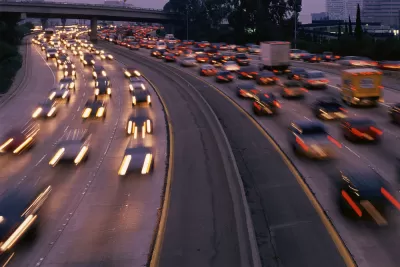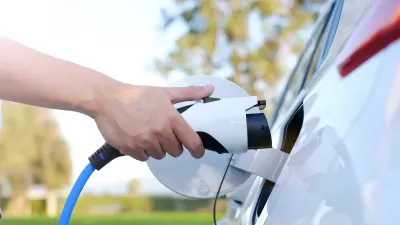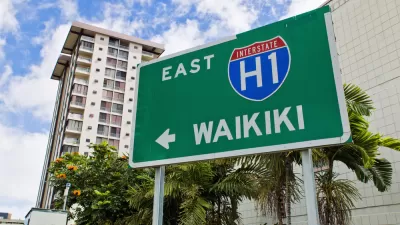EV sales are increasing–good news for the environment but bad news for road funding, as they pay no fuel taxes. Fortunately, the bipartisan infrastructure law has $125 million earmarked to "demonstrate a national motor vehicle per-mile user fee."

July 1 will mark the eighth anniversary of the nation's first ongoing mileage fee program, often referred to as a road usage charge. Sometime next month, Oklahoma will become the latest state to launch a 6-month demonstration program of charging motorists by the mile they drive rather than by the gallon of fuel they burn.
Despite much talk about this alternative user fee to motor vehicle fuel taxes to keep U.S. roads in good repair, progress has been painfully slow. To date, there are only three such revenue programs in existence in the U.S.: Oregon, Utah and Virginia, with Hawaii soon to join them, reports Julie Carr Smyth in the source article published June 24 in The Associated Press.
And soon, though we don't know when, the federal government will launch its own pilot program funded with $125 million designated in the Infrastructure Investment and Jobs Act (IIJA), aka bipartisan infrastructure law, signed into law by President Biden on November 15, 2021.
U.S. Department of Energy?
The first step in establishing the pilot will be the formation of a Federal System Funding Alternative Advisory Board, according to a webpage titled, "Federal System Alternative Funding Pilot" found in the Alternative Fuels Data Center (AFDC) division of the U.S. Department of Energy (DOE).
Planetizen has reported on projects funded by the $1.3 trillion IIJA administered by DOE, with the most recent being hydrogen hubs and carbon management. More recently, Planetizen reported on the announcement of the Federal Alternative Fuel Charging Grant program, part of a nationwide EV charging network, operated by the U.S. Department of Transportation's Federal Highway Administration (FHWA) that has its own IIJA webpage.
Late start
The AFDC description of the pilot program states, "DOT shall establish the Board by February 13, 2022, with Board findings relevant to implementing the Fee pilot program due to Congress one year later."
An email received June 28 from the FHWA's Public Affairs office indicated that they are indeed off to a late start:
FHWA statement on background from an FHWA spokesperson: FHWA is preparing a Federal Register Notice to seek nominations to the Federal System Funding Alternative Advisory Board. The federal advisory committee will provide input in establishing the parameters necessary to launch a voluntary pilot program to demonstrate a national motor vehicle per-mile user fee.
The late start is not entirely surprising as it is consistent with what some critics of the program have said. Eric Paul Dennis, a transportation analyst at the Citizens Research Council of Michigan, told Smyth of The AP, “There’s no program design that I have seen that I think can be implemented at scale in a way that is publicly acceptable."
Indeed, a review of Planetizen's extensive posts tagged 'road usage charge' reveals the slow progress of these programs, also referred to as mileage-based user fees, as well as criticism, although that was five years ago:
- Road Usage Charge at Least 10 Years Away, March 12, 2018
- An Argument Against VMT Fees as Replacements for Gas Taxes, February 6, 2018
- The Slow Transition from Gas Taxes to Mileage Fees, January 17, 2018
FULL STORY: As fuel taxes plummet, states weigh charging by the mile instead of the tank

Study: Maui’s Plan to Convert Vacation Rentals to Long-Term Housing Could Cause Nearly $1 Billion Economic Loss
The plan would reduce visitor accommodation by 25,% resulting in 1,900 jobs lost.

Alabama: Trump Terminates Settlements for Black Communities Harmed By Raw Sewage
Trump deemed the landmark civil rights agreement “illegal DEI and environmental justice policy.”

North Texas Transit Leaders Tout Benefits of TOD for Growing Region
At a summit focused on transit-oriented development, policymakers discussed how North Texas’ expanded light rail system can serve as a tool for economic growth.

Paris Bike Boom Leads to Steep Drop in Air Pollution
The French city’s air quality has improved dramatically in the past 20 years, coinciding with a growth in cycling.

Why Housing Costs More to Build in California Than in Texas
Hard costs like labor and materials combined with ‘soft’ costs such as permitting make building in the San Francisco Bay Area almost three times as costly as in Texas cities.

San Diego County Sees a Rise in Urban Coyotes
San Diego County experiences a rise in urban coyotes, as sightings become prevalent throughout its urban neighbourhoods and surrounding areas.
Urban Design for Planners 1: Software Tools
This six-course series explores essential urban design concepts using open source software and equips planners with the tools they need to participate fully in the urban design process.
Planning for Universal Design
Learn the tools for implementing Universal Design in planning regulations.
Smith Gee Studio
Alamo Area Metropolitan Planning Organization
City of Santa Clarita
Institute for Housing and Urban Development Studies (IHS)
City of Grandview
Harvard GSD Executive Education
Toledo-Lucas County Plan Commissions
Salt Lake City
NYU Wagner Graduate School of Public Service




























